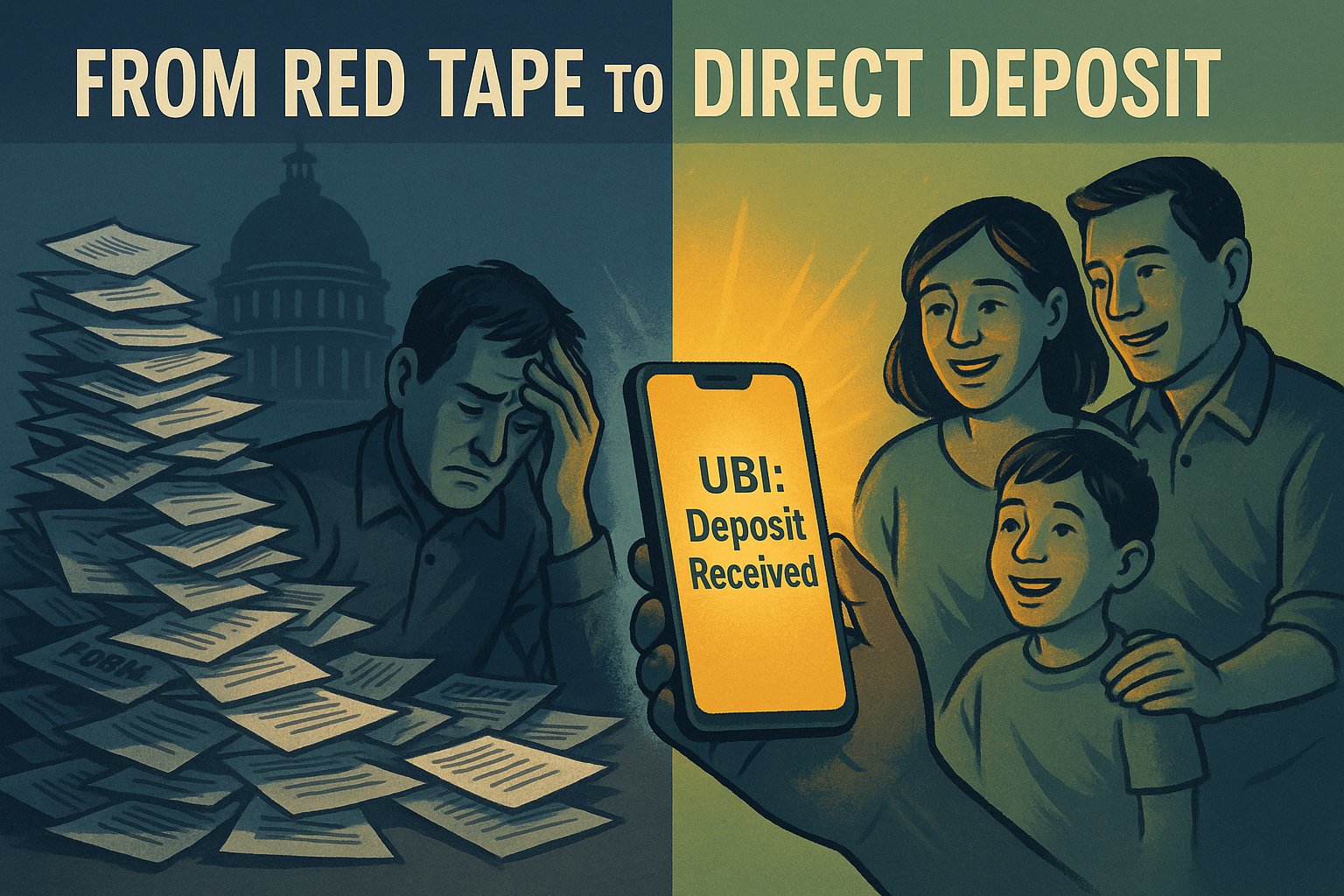From Bureaucracy to Dignity – Why UBI Is the Smarter Path Forward
From Red Tape to Direct Deposit
In the shadow of yet another federal budget proposal threatening cuts to SNAP and TANF, it’s time to ask a hard question: Is the welfare system we’ve built still working? For millions of Americans, the answer is increasingly clear. The current model—fragmented, means-tested, paperwork-heavy—isn’t lifting people up. It’s keeping them down. It’s time to evolve beyond the patchwork of outdated programs and embrace a simpler, more just idea: Universal Basic Income (UBI).
Universal Basic Income is not a radical fantasy. It’s a pragmatic upgrade. It provides every citizen a regular, unconditional cash payment—no forms, no eligibility traps, no stigma. It’s a clean foundation under every household, not a crumbling safety net riddled with holes.
The Welfare Trap: A System Designed to Fail
At the heart of the current system lies a cruel paradox: to receive help, you have to prove how little you have. But the moment you start earning more—getting a raise, picking up extra hours, starting a side hustle—you risk losing the benefits keeping you afloat. This is known as the “welfare cliff,” which punishes upward mobility.
This isn’t just inefficient. It’s demoralizing. It teaches people that staying poor is safer than trying to get ahead.
Meanwhile, navigating the maze of programs—from food stamps and housing assistance to job training and healthcare—is overwhelming and time-consuming. Every program has its own criteria, deadlines, paperwork, and approval processes. People waste hours (or days) proving their poverty to gatekeepers. The bureaucracy costs billions in administrative overhead, but still leaves families under-supported and over-scrutinized.
UBI: Simpler, Smarter, and More Humane
UBI flips this script. Instead of a bureaucratic obstacle course, every citizen gets a direct deposit. Rich or poor, employed or not, you receive the same amount. That’s the point—it’s universal. It’s a recognition that security should not be a privilege but a right in a modern economy.
Unlike traditional welfare, UBI doesn’t vanish the moment someone starts earning more. It doesn’t create a disincentive to work. In fact, pilots around the world show that basic income increases people’s ability to take risks—start businesses, return to school, care for family members—without the existential fear of losing everything.
It’s not just about freedom. It’s about dignity.
Smaller Government, Bigger Impact
Here’s the kicker: UBI could actually reduce the size of government. By consolidating or replacing overlapping cash-assistance programs, we can cut administrative costs, reduce fraud, and deliver support more efficiently.
We automate a recurring deposit in place of layers of social workers, application offices, and eligibility audits. Technology makes this feasible. What once required an army of caseworkers can now be managed with secure databases and simple distribution systems, just like we did with pandemic stimulus checks.
Funded by Our Shared Wealth
Where does the money come from? That’s where the National Wealth Fund enters the picture. By capturing revenue from our shared resources—carbon pricing, data use, land leases, and other commons-based income—we can create a permanent endowment that pays dividends to every American.
Think of it as a public trust: as the economy grows, and as we better manage our environmental and digital commons, the fund grows. And it pays you back. Every citizen gets a share of the nation’s wealth—not through handouts, but through collective investment.
Conclusion: Build the Future, Not the Failures of the Past
As lawmakers debate cutting essential lifelines for the most vulnerable, we have a choice. We can defend a broken system or build something better.
Universal Basic Income is not a replacement for all social services. But it is the foundation we need to build a stronger, fairer, freer society. It’s the smart solution to poverty, complexity, and systemic inequality.
The future won’t wait. It’s time we stopped tinkering at the edges and started designing a system that works for everyone.
Join the conversation. Share your story. Help us build the Prosperity Loop.
Visit https://prosperityloop.org/join/ and learn how you can help.
